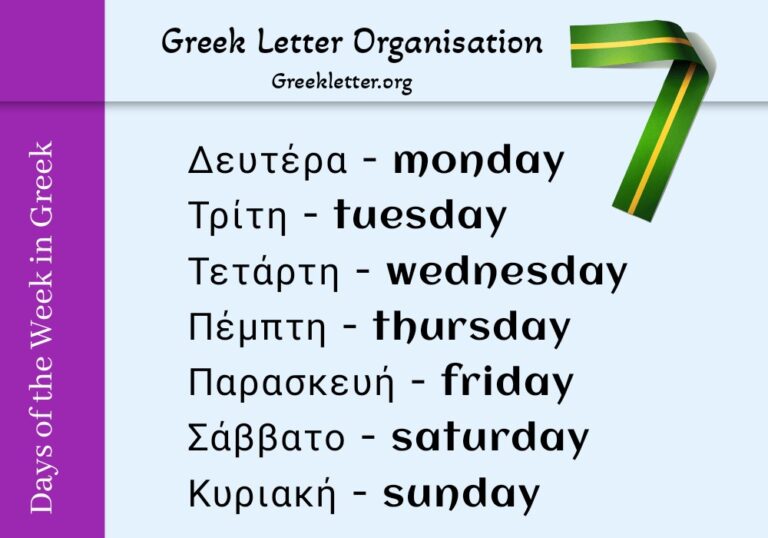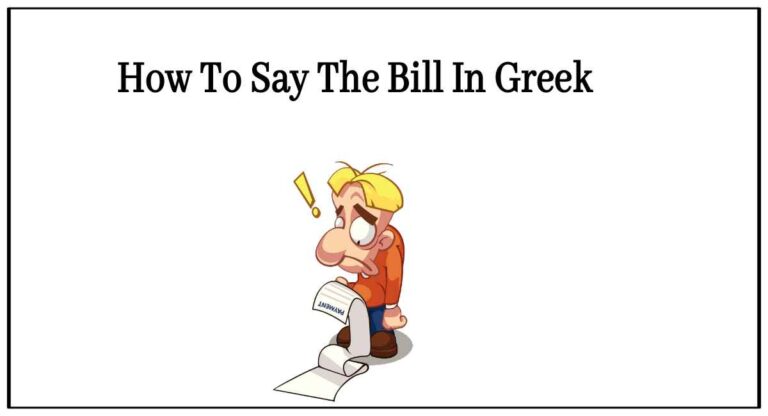How Do U Say Thank U In Greek Pronunciation
Have you ever found yourself in a situation where you wanted to express gratitude in Greek but didn’t know how: How Do U Say Thank U In Greek?
Learning how to say thank you in different languages is useful for travelers and a great way to connect with people from diverse backgrounds.
This article will delve into different methods of expressing gratitude in Greek, covering pronunciation and the associated characters.
Whether planning a trip to Greece or simply curious about the language, these frequently asked questions will provide all the answers you need to show your appreciation in Greek. So, let’s dive into this linguistic journey and discover how to say thank you like a native speaker!
How Do you say Thank you in Greek?
In Greek, “Thank you” is expressed as “Ευχαριστώ” (pronounced ef-khah-rees-TOH). This is the standard way to say “thank you” in Greek. It’s a polite and commonly used phrase to express gratitude in various situations. Whether you’re receiving a favor, a gift, or any form of assistance, saying “Ευχαριστώ” is a courteous way to show your appreciation.
Here’s a breakdown of the word and pronunciation:
- Ευχαριστώ (ef-khah-rees-TOH)
- Ευχαριστώ (ef-khah-rees-TOH): This is the Greek word for “thank you.”
- Pronunciation: Break it down into syllables: ef-khah-rees-TOH. Pay attention to the stress on the third syllable, “rees.”
Remember to say it with a smile and genuine appreciation to convey your thanks effectively in Greek.
How Do U Say Thank U In Greek Pronunciation
In Greek, “Thank you” is pronounced as “Ευχαριστώ,” which is romanized as “Efcharistó.” Here’s a breakdown of the pronunciation:
Ευχαριστώ (Efcharistó)
Ευχαριστώ (Efcharistó): This is the Greek phrase for “thank you.”
Pronunciation:
- Ευ (Ef): Pronounced like “ef” in the English word “effort.”
- χα (cha): Pronounced like “cha” in the Scottish word “loch.”
- ρι (ri): Pronounced like “ree” in the English word “reef.”
- στώ (stó): Pronounced like “sto” in the English word “stop.”
When saying “Ευχαριστώ,” emphasize the “Ευ” (Ef) and “στώ” (stó) syllables slightly, as the stress falls on these parts of the word.
How Do U Say Thank U In Greek Letters
In Greek, “Thank you” is written as “Ευχαριστώ,” which is spelled using Greek letters. Here’s the breakdown of the phrase:
Ευχαριστώ (Efcharistó): This is the Greek phrase for “thank you” written in Greek letters.
Here’s how to write it letter by letter:
- Ε (Εψιλον, Epsilon): The first letter, “Ε,” is called “Epsilon” and is equivalent to the English letter “E.”
- υ (Υψιλον, Ypsilon): The second letter, “υ,” is called “Ypsilon” and is equivalent to the English letter “Y.”
- χ (Χι, Chi): The third letter, “χ,” is called “Chi” and does not have a direct equivalent in English, but it’s pronounced like “ch” in “loch.”
- α (Αλφα, Alpha): The fourth letter, “α,” is called “Alpha” and is equivalent to the English letter “A.”
- ρ (Ρο, Rho): The fifth letter, “ρ,” is called “Rho” and is equivalent to the English letter “R.”
- ι (Ιώτα, Iota): The sixth letter, “ι,” is called “Iota” and is equivalent to the English letter “I.”
- σ (Σίγμα, Sigma): The seventh letter, “σ,” is called “Sigma” and is equivalent to the English letter “S.”
- τ (Ταυ, Tau): The eighth letter, “τ,” is called “Tau” and is equivalent to the English letter “T.”
- ώ (Όμικρον, Omicron with tonos): The ninth letter, “ώ,” is called “Omicron with tonos” and represents a long “o” sound.
So, “Ευχαριστώ” is the Greek phrase for “thank you” written using Greek letters.
How Do U Say Thank U In Greek Audio
In Greek culture, expressing gratitude is highly valued, and saying thank you is an important part of daily interactions. The phrase used to say thank you in Greek is efcharistó (ευχαριστώ).
It’s a powerful word that encapsulates appreciation, sincerity, and acknowledgment of someone’s kindness or help. So, let’s take a moment to learn how to pronounce it properly!
Now that you’ve listened to the audio pronunciation, you might have noticed the emphasis on syllables. The first two syllables – ef-char – are said with more stress and slightly longer duration than the last two syllables – istó.
Attention to these details will help you feel confident when expressing your gratitude in Greek. Remember, learning to say thank you in another language is helpful for traveling and shows respect and interest in different cultures!
Greek Phrases for Social Situations: Your Key to Local Connections
If you plan a trip to Greece or want to connect with Greek-speaking friends and acquaintances, learning some key Greek phrases for social situations can go a long way in making meaningful connections. Here are some essential Greek phrases and their pronunciations to help you navigate various social scenarios with ease:
Hello / Hi:
- Greek: Γειά σας (Yia sas)
- Pronunciation: yee-ah sahs
Good morning:
- Greek: Καλημέρα (Kaliméra)
- Pronunciation: ka-lee-MEH-rah
Good evening:
- Greek: Καλησπέρα (Kalispéra)
- Pronunciation: ka-lee-SPAY-rah
Good night:
- Greek: Καληνύχτα (Kaliníkhta)
- Pronunciation: ka-lee-NEEKH-tah
How are you?:
- Greek: Τι κάνετε; (Ti kánate?) – formal
- Greek: Τι κάνεις; (Ti kánis?) – informal
- Pronunciation (formal): tee KAH-neh-teh
- Pronunciation (informal): tee KAH-nees
I’m fine, thank you:
- Greek: Καλά, ευχαριστώ (Kalá, efcharistó)
- Pronunciation: ka-LAH, ef-khah-ree-STOH
What’s your name?:
- Greek: Πώς σας λένε; (Pós sas léne?) – formal
- Greek: Πώς σε λένε; (Pós se léne?) – informal
- Pronunciation (formal): pos sahs LEH-neh
- Pronunciation (informal): pos seh LEH-neh
My name is…:
- Greek: Λέγομαι… (Légome…)
- Pronunciation: LEH-gho-meh
Please:
- Greek: Παρακαλώ (Parakaló)
- Pronunciation: pah-rah-KAH-loh
Thank you:
- Greek: Ευχαριστώ (Efcharistó)
- Pronunciation: ef-khah-ree-STOH
Yes:
- Greek: Ναι (Nai)
- Pronunciation: neh
No:
- Greek: Όχι (Óchi)
- Pronunciation: OH-khee
Excuse me / I’m sorry:
- Greek: Συγγνώμη (Signómi)
- Pronunciation: seen-YOH-mee
I don’t understand:
- Greek: Δεν καταλαβαίνω (Den katalavaíno)
- Pronunciation: then ka-tah-lah-VEH-no
How much does this cost?:
- Greek: Πόσο κοστίζει αυτό; (Póso kostízei aftó?)
- Pronunciation: POH-so kos-TEE-zeh af-TOH?
Can you help me?:
- Greek: Μπορείτε να με βοηθήσετε; (Boreíte na me voithísete?) – formal
- Greek: Μπορείς να με βοηθήσεις; (Boreís na me voithíseis?) – informal
- Pronunciation (formal): bo-reí-te na me vo-ee-THEE-se-teh
- Pronunciation (informal): bo-reís na me vo-ee-THEE-sees
Learning these phrases will help you communicate and show respect for the Greek culture and language. Whether you’re ordering food, shopping, or striking up conversations, these phrases will prove valuable during your interactions in Greece.
Conclusion Points
In conclusion, expressing gratitude is an important gesture in any language, and Greek is no exception. Learning how to say thank you in Greek can enhance cultural understanding and foster stronger connections with native speakers.
Individuals can confidently express appreciation in this beautiful language by mastering the pronunciation and understanding of the Greek letters used to write thank you.
So, next time you want to show your gratitude to someone who speaks Greek, remember the phrase ευχαριστώ (efharistó) and feel free to use it with confidence! Embrace the power of saying thank you in Greek and open the door to deeper communication and relationships.
FAQs
1. How do you say thank you in Greek?
In Greek, thank you is pronounced as efharisto.
2. How do you pronounce thank you in Greek?
The pronunciation of thank you in Greek is eh-fha-REE-stoh.
3. How do you write thank you in Greek letters?
In Greek letters, thank you can be written as ευχαριστώ.
4. What is the proper way to express gratitude in Greek?
The most common and polite way to express gratitude in Greek is by saying efharisto, meaning thank you.
5. Are there any other ways to say thank you in Greek?
Yes, apart from efharisto, another informal way to say thank you is by using the word sas efcharistó, which is more formal.
6. Can I use any other expressions of thanks in the Greek language?
Certainly! You can also use phrases like sas parakalo, meaning you’re welcome, or say merci, which means thank you in French but is commonly used among Greeks.
7. Is it important to show gratitude in Greek culture?
Absolutely! Expressing gratitude and appreciation is highly valued in Greek culture, and it’s considered good manners to thank others for their actions or gestures.
8. Are there any gestures that accompany saying thank you in Greece?
While not mandatory, a warm smile and eye contact are often used with the verbal expression of thanks as a sign of genuine appreciation in Greece.






